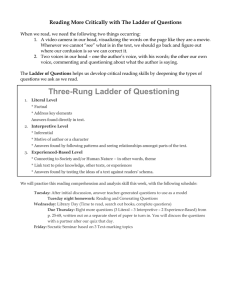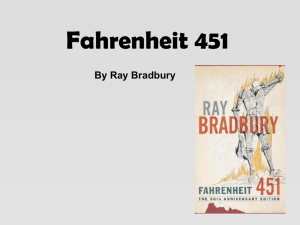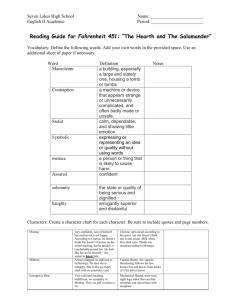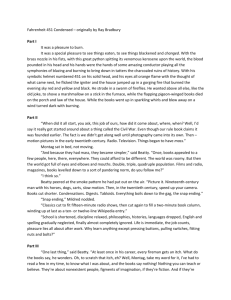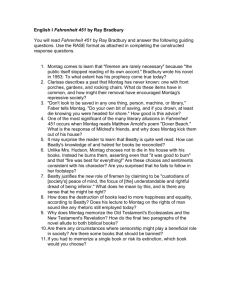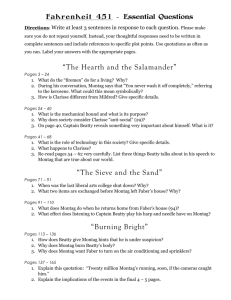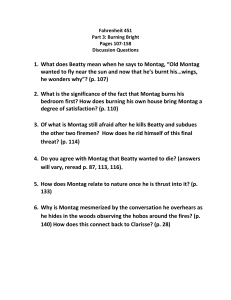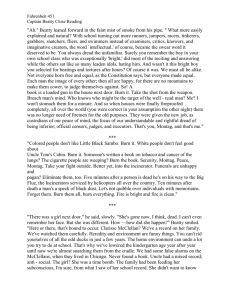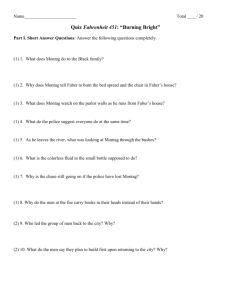Fahrenheit 451: Comprehension Check - Part One
advertisement
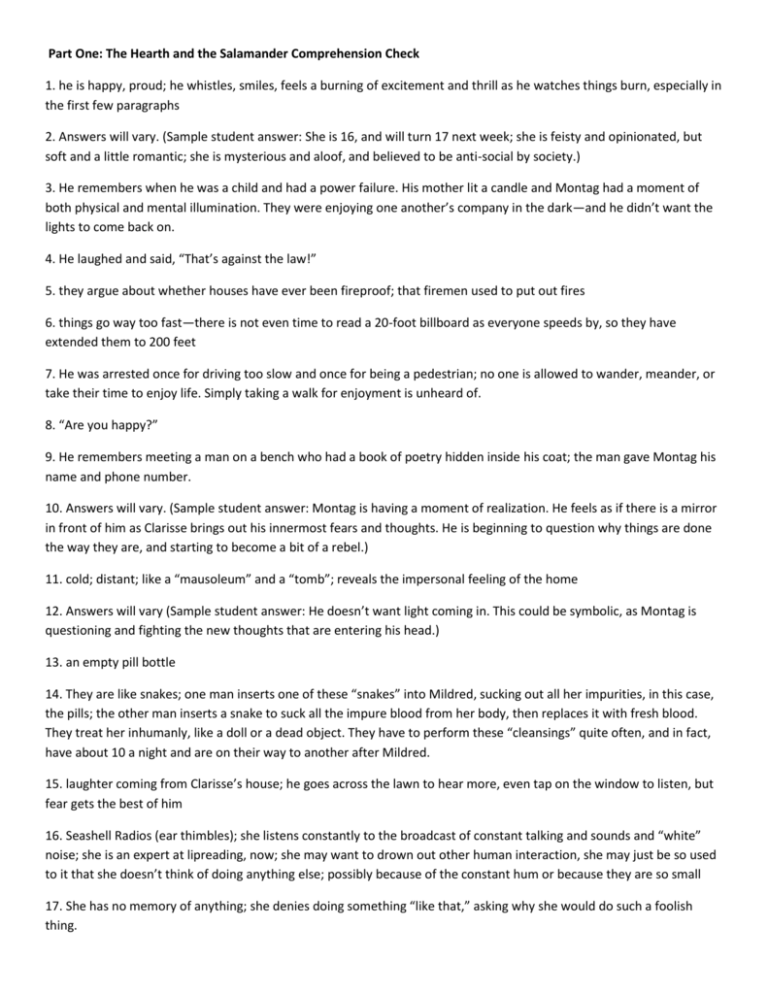
Part One: The Hearth and the Salamander Comprehension Check 1. he is happy, proud; he whistles, smiles, feels a burning of excitement and thrill as he watches things burn, especially in the first few paragraphs 2. Answers will vary. (Sample student answer: She is 16, and will turn 17 next week; she is feisty and opinionated, but soft and a little romantic; she is mysterious and aloof, and believed to be anti-social by society.) 3. He remembers when he was a child and had a power failure. His mother lit a candle and Montag had a moment of both physical and mental illumination. They were enjoying one another’s company in the dark—and he didn’t want the lights to come back on. 4. He laughed and said, “That’s against the law!” 5. they argue about whether houses have ever been fireproof; that firemen used to put out fires 6. things go way too fast—there is not even time to read a 20-foot billboard as everyone speeds by, so they have extended them to 200 feet 7. He was arrested once for driving too slow and once for being a pedestrian; no one is allowed to wander, meander, or take their time to enjoy life. Simply taking a walk for enjoyment is unheard of. 8. “Are you happy?” 9. He remembers meeting a man on a bench who had a book of poetry hidden inside his coat; the man gave Montag his name and phone number. 10. Answers will vary. (Sample student answer: Montag is having a moment of realization. He feels as if there is a mirror in front of him as Clarisse brings out his innermost fears and thoughts. He is beginning to question why things are done the way they are, and starting to become a bit of a rebel.) 11. cold; distant; like a “mausoleum” and a “tomb”; reveals the impersonal feeling of the home 12. Answers will vary (Sample student answer: He doesn’t want light coming in. This could be symbolic, as Montag is questioning and fighting the new thoughts that are entering his head.) 13. an empty pill bottle 14. They are like snakes; one man inserts one of these “snakes” into Mildred, sucking out all her impurities, in this case, the pills; the other man inserts a snake to suck all the impure blood from her body, then replaces it with fresh blood. They treat her inhumanly, like a doll or a dead object. They have to perform these “cleansings” quite often, and in fact, have about 10 a night and are on their way to another after Mildred. 15. laughter coming from Clarisse’s house; he goes across the lawn to hear more, even tap on the window to listen, but fear gets the best of him 16. Seashell Radios (ear thimbles); she listens constantly to the broadcast of constant talking and sounds and “white” noise; she is an expert at lipreading, now; she may want to drown out other human interaction, she may just be so used to it that she doesn’t think of doing anything else; possibly because of the constant hum or because they are so small 17. She has no memory of anything; she denies doing something “like that,” asking why she would do such a foolish thing. 18. it is really about nothing; she plays the part of the homemaker; she knows nothing of a plot except for the fact that it is about “people named Bob and Ruth and Helen”; she wants another wall so that she can be surrounded by “family” 19. he really looks at her and listens to her 20. it “sleeps but does not sleep”; it is a machine shaped like a dog that hunts for its prey (whatever it has been programmed against) using a highly sensitive olfactory system; it has a needle that injects morphine or procaine into its victims; its purpose is to hunt and kill anyone who goes against the “system”; he doesn’t like it—he feels as if it is after him. 21. she is different, and does not behave like she is supposed to; they play violent games and sports, go to the Fun Park and bully people, break windowpanes, wreck cars with a steel ball, or race and drive around looking for victims. Reactions will vary. 22. things that are very unimportant; cars, clothes, swimming pools and say “how swell”; she doesn’t like things being “abstract” because her uncle told her about a time when pictures showed people and “said things”. 23. the sound of planes screaming; war beginning 24. She wants to die by suicide because if she can’t have her books, she doesn’t want to live. 25. a book; he is curious beyond help; he hides it under his pillow 26. “When did we meet? And where?”; to know the significance of their relationship—how deep it is (or is not) 27. He was certain he wouldn’t cry if Mildred died. 28. She feels like they are her family. He knows that they are just two-dimensional figures, and knows that she cares more for them than she does for him. 29. that she was run over and killed by a car four days ago; she had forgotten to tell him—she really didn’t care—which shows her callousness 30. They do not love each other; in many ways, they do not even know each other. They rarely communicate, and like the others in this society, do not talk about feelings or anything important. 31. that he knows about the books and Montag’s curiosity; that Beatty knows a lot and was a reader at one time 32. Beatty tells Montag that the people of their society are to blame for the disappearance of books; that society had more interest in TV and radio, condensed books, and a rapid-moving pace than actually reading a book and getting anything out of it. Reactions will vary. 33. Bradbury reveals his feelings about media such as TV, radio, condensed books, and lack of thought; he also reveals his distaste for sensory over-stimulation, lack of education, and poor state of education or thinkers in the society. Answers will vary. 34. Bradbury has some strong opinions about schools, including that “school is shortened, discipline is relaxed, philosophies, histories, languages dropped, English and spelling gradually, gradually neglected, finally almost completely ignored.” Responses will vary. 35. Society is to blame. People had no interest in learning or obtaining new information, and allowed the government to take over because of their lack of concern. 36. comic books, sex-magazines, confessions, and trade journals; the ultimate goal is equality—so no one feels inferior 37. “official censors, judges, and executors”; to have everyone happy and able to feel good about themselves and their ability to recall and memorize unimportant data, rather than philosophies or theories that make them think or question anything 38. they allow him to keep it for 24 hours, then burn it; if he doesn’t, the firemen come in to burn it for him 39. they don’t want to encourage people to talk to each other—there is no need for them 40. the books he had in the ventilator; she immediately grabs what she can and throws them in the incinerator


